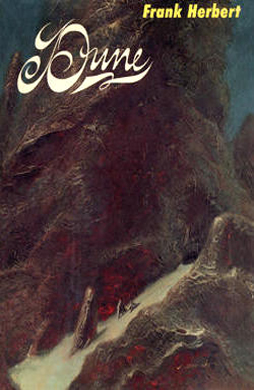
Dune by Frank Herbert
Here’s a superb work of future fiction that achieved franchise status when the novel became a series of feature films. The book follows the adventures of an enigmatic character named Muad’Dib, who avenges traitorous moves against his family and then goes on to achieve near-messianic status among all the people on his desert planet, Arrakis. A sweeping and well-told story, Dune won the first ever Nebula Award, shared the Hugo Award, and has been called, arguably, the greatest epic tale in science fiction history. Among the novel’s future fiction elements was the introduction of innovative “stillsuits,” close-fitting garments that capture body moisture and recycle it for drinking. This concept is nearing realization today by the production of a backpack-sized device simply dubbed “The Sweat Machine” which captures fluid from sweat-soaked clothing, heats and distills it and, ultimately, renders it into drinkable water. It is expected to ultimately save many lives in the far-flung desert environments of the world.
About Frank Herbert
Herbert was born in Tacoma, Washington, in 1920, but left his home there at age 18 to live with relatives in Salem, Oregon. He entered college, which he never finished, after World War Two, and it was during this time that he developed an affinity for science fiction. In the Fifties he began writing short stories for that genre’s pulp magazines, publishing about two dozen brief tales. But he received a prophetic glimpse of his authorial future while researching a story on sand dunes near Florence, Oregon about that time. The novel that sprang from that inspiration -- and that would secure his place in future fiction history -- was slow in coming after that, not actually finished until 1965. Then, it was rejected 20 times before a publisher took a chance and brought it before an eager public. Since then, it has been translated into 14 languages and sold more than 12 million copies -- more than any other science-fiction book in history.According to an article on Biblio.com, “Dune was the first ecological science fiction novel, containing a multitude of big, interrelating themes and multiple character viewpoints, a method which ran through all Herbert's mature work.” The series is widely considered to be among the classics of the genre.
Futurist Themes:
- Human Congnitive Advances
- Environmental Stress and Consequences
- The Decline of Empires
© Copyright 2021. All Rights Reserved. | Made and Maintained by Virtual Crayon
